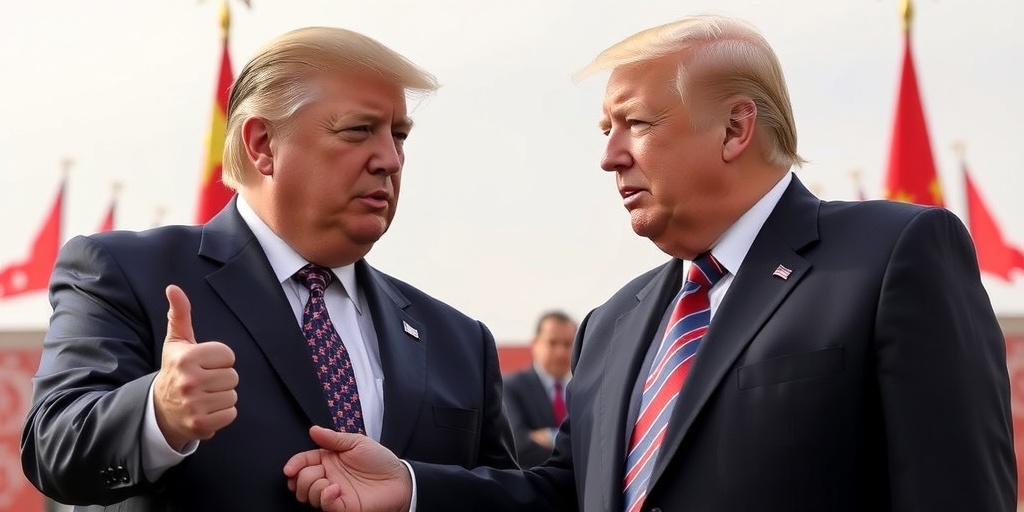Now Reading: China Imposes Tariffs on Canada in Response to Trump
-
01
China Imposes Tariffs on Canada in Response to Trump
China Imposes Tariffs on Canada in Response to Trump

China Implements Severe Tariffs on Canadian Agricultural Products in Response to Trade Disputes
In a significant escalation of trade tensions, China announced on Saturday its decision to impose tariffs of up to 100 percent on several Canadian agricultural products, including canola oil and pork. This action serves as retaliation against Canada’s recent decision to enforce substantial import taxes on Chinese electric vehicles, steel, and aluminum. The tariffs will come into effect on March 20, marking a new phase in the ongoing trade conflict between the two nations.
The Chinese government’s announcement, made by its State Council Tariff Commission, underscores Beijing’s displeasure with Canada’s trade policies, particularly its implementation of 100 percent tariffs on Chinese electric vehicles and 25 percent tariffs on steel and aluminum, which went into effect last October. The Chinese commission stated that the new tariffs would include a notorious 100 percent levy on canola oil, Canada’s most significant export to China, along with 25 percent tariffs on pork and seafood. The timing and magnitude of these tariffs illustrate China’s determination to counteract perceived unfair trade practices.
China’s Ministry of Commerce issued a statement urging Canada to "immediately correct its wrong practices," indicating Beijing’s intention to pressure Ottawa to lift its restrictions. The language used in the statements from Chinese officials aligns with World Trade Organization (WTO) guidelines, allowing them to express discontent without violating international trade regulations. Nonetheless, a commentary aired on Chinese state television emphasized that these tariffs were a strategic move aimed at discouraging both Canada and Mexico from aligning too closely with U.S. trade demands.
The trade relationship between Canada and China has become increasingly strained under the weight of geopolitical tensions and economic nationalism. Prime Minister Justin Trudeau had imposed tariffs on Chinese imports partly to protect Canadian automotive investments in electric vehicle manufacturing. However, there has been growing criticism from both the Biden and Trump administrations regarding the influx of Chinese goods into Canada, with fears that they serve as a backdoor into the U.S. market.
As the tariffs kick in, Canadian canola producers may face considerable challenges. In 2022, Canada exported $3.29 billion worth of canola to China, representing 13.4 percent of its total exports to the country. Last autumn, Canadian traders were quick to sell their supplies to Chinese stockpiles in anticipation of impending tariffs, highlighting the delicate nature of this trade dynamic.
Reacting to these developments, Canada’s government has yet to comment publicly on China’s latest tariff announcement. However, past actions indicate that the Canadian government is likely to seek a response that balances its commitments to domestic producers with its trade relations with China. The context of this trade conflict is further complicated by broader tensions related to U.S. trade policies under both the Trump and Biden administrations, which have pressured Canada and Mexico to curb Chinese imports.
Canada has found itself in a precarious position, especially considering that for every dollar’s worth of goods Canada exports to China, China exports approximately $3 worth of goods back. This geopolitical imbalance gives China significant leverage in the ongoing trade disputes. However, it’s notable that trade between Mexico and China has surged dramatically, with Chinese exports to Mexico doubling since 2019, showcasing the evolving dynamics in North American trade relationships.
The current tariffs imposed by China are reminiscent of past trade disputes, particularly a two-year tariff on Canadian canola that began in February 2019. This earlier tariff followed Canada’s detention of Huawei executive Meng Wanzhou on a U.S. warrant, leading to strained relations between Canada and China, including the imprisonment of two Canadians under adverse conditions in China. The subsequent diplomatic resolution left a lingering distrust among Canadians towards China, further complicating trade negotiations.
The implications of these new tariffs extend beyond agriculture and into broader Canadian economic interests, where steel and aluminum industries, heavily reliant on the U.S. market, face uncertain futures. With rising trade surpluses between Canada, Mexico, and the United States, the stakes of these tariff disputes have become increasingly pronounced as both Canadian manufacturers and policymakers navigate a complex web of international trade relations.
As Canada grapples with the economic impact of these tariffs, it remains to be seen how the government will respond to maintain its trade commitments while protecting its domestic industries. This ongoing trade saga is poised to intensify, affecting not only Canadian agricultural producers but also the future of North American trade dynamic amid global competition with China.
Stay Informed With the Latest & Most Important News
Previous Post
Next Post
-
 01New technology breakthrough has everyone talking right now
01New technology breakthrough has everyone talking right now -
 02Unbelievable life hack everyone needs to try today
02Unbelievable life hack everyone needs to try today -
 03Fascinating discovery found buried deep beneath the ocean
03Fascinating discovery found buried deep beneath the ocean -
 04Man invents genius device that solves everyday problems
04Man invents genius device that solves everyday problems -
 05Shocking discovery that changes what we know forever
05Shocking discovery that changes what we know forever -
 06Internet goes wild over celebrity’s unexpected fashion choice
06Internet goes wild over celebrity’s unexpected fashion choice -
 07Rare animal sighting stuns scientists and wildlife lovers
07Rare animal sighting stuns scientists and wildlife lovers





















